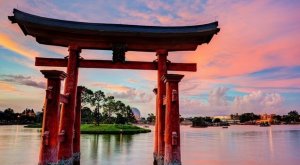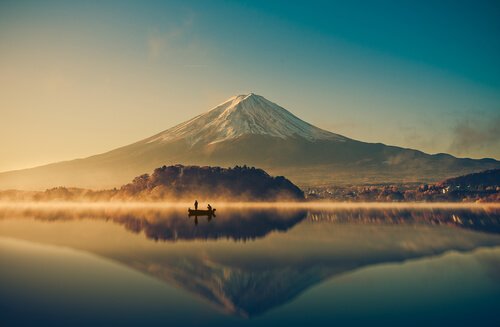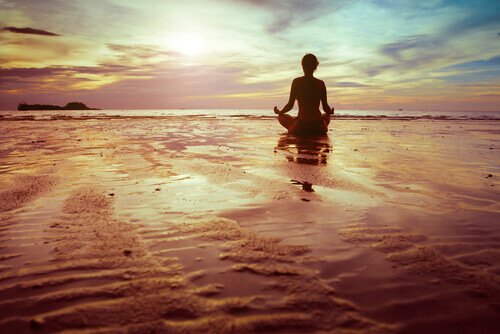Ikigai: the Mysterious Japanese Way of Finding Happiness


Written and verified by the psychologist Gema Sánchez Cuevas
In our culture there is no word that defines the meaning of what in Japanese culture is called the ikigai. According to the Japanese, everyone has an ikigai, a reason to exist. Some have found it and are aware of it. Others have it inside them, but they are still not aware of it, or they may never reach it. Behind it all lies the secret of discovering true happiness.
Our society bombards us with the culture of materialism. How important it is to have more and more money, a better car or a luxurious home. This pushes us to work harder and harder to try to get all these things, but at the same time we lose our inner well-being. Jobs are increasingly difficult to find. In most cases we are obliged to accept them, not by vocation but by necessity. In the end, this situation becomes a vicious circle which is very difficult to escape from. It also creates great personal dissatisfaction.
In the book Ikigai: Japan’s secret for a long and happy life, Hector García and Francesc Miralles have captured the experiences of the Japanese centenarians of the village of Ogami. In particular their experiences regarding a happy and healthy life. Additionally, they describe some keys for each one of us to look inside ourselves to discover the reason for our existence. By doing this, your self-esteem will increase and you will begin to be aware of those activities or ways of life that can lead to a state of inner peace.
“Happiness is the meaning and purpose of life, the whole purpose of human existence.”
Here are some keys that this Japanese mystery reveals to us in its search for happiness:
Ikigai, the reason to live
The reason why these Japanese centenarians get up every morning is the foundation or legitimate reason that justifies their existence. For them there is no word or concept to describe retirement. They continue carrying out the same tasks until the end of their days, because it fills them with great satisfaction to do what they like doing for the good of the community.
“The objective is to identify what each of us is good at, and what gives us pleasure when it comes to carrying it out. That also makes us aware that we are contributing something to the world. When we carry it out, we have more self-esteem, because we feel that our presence in the world is justified. Happiness would be the consequence, “says Miralles.

Encourage social relationships
Japanese elderly people offer themselves for everything that is related to their surroundings. That is how they feel part of the community and useful in their society.
Encouraging and promoting social relationships has a very positive effect on our quality of life. When we relate to others, our mood improves and this gives us great emotional benefits. Relationships help us to be more independent, decisive and to improve our cognitive abilities.
Healthy nutrition
The Japanese secret for healthy eating is based on eating a variety of foods in small dishes. Raw fruits and vegetables are the foundation of their diet. They hardly ever eat sugar directly and, if they do, it is sugarcane, grown in their own fields.
They eat fewer calories and to achieve this they are governed by hara hachi bu, a principle that says that you should stop eating when you are at 80% of your stomach capacity.
Think positive
The inhabitants of Ogami lead a life free of stress and anxiety. For them the idea of rushing doesn’t exist. Optimism and smiling are the main laws that are reflected in the laws of ikigai.
Our actions are based on our thoughts. If we change the way we think, we can begin to change the decisions we make. Human beings always seek personal growth, both physically and emotionally. Practicing positive internal conversations can help us to carry out actions that lead to great achievements.
Practice exercise
Every morning the residents practice group exercise before starting the daily routine. These are basic exercises that consist of stretching the muscles and moving the joints. The purpose of this physical activity is to reinforce the spirit of cooperation and unity of all the participants.
“Very little is needed to make a happy life. It is all within yourself, in your way of thinking.”

The search for our ikigai can be a long one. But once we find it we will feel that happiness invades us. We will have found our “reason to exist” that is based on four basic pillars: passion, vocation, mission and profession.
In our culture there is no word that defines the meaning of what in Japanese culture is called the ikigai. According to the Japanese, everyone has an ikigai, a reason to exist. Some have found it and are aware of it. Others have it inside them, but they are still not aware of it, or they may never reach it. Behind it all lies the secret of discovering true happiness.
Our society bombards us with the culture of materialism. How important it is to have more and more money, a better car or a luxurious home. This pushes us to work harder and harder to try to get all these things, but at the same time we lose our inner well-being. Jobs are increasingly difficult to find. In most cases we are obliged to accept them, not by vocation but by necessity. In the end, this situation becomes a vicious circle which is very difficult to escape from. It also creates great personal dissatisfaction.
In the book Ikigai: Japan’s secret for a long and happy life, Hector García and Francesc Miralles have captured the experiences of the Japanese centenarians of the village of Ogami. In particular their experiences regarding a happy and healthy life. Additionally, they describe some keys for each one of us to look inside ourselves to discover the reason for our existence. By doing this, your self-esteem will increase and you will begin to be aware of those activities or ways of life that can lead to a state of inner peace.
“Happiness is the meaning and purpose of life, the whole purpose of human existence.”
Here are some keys that this Japanese mystery reveals to us in its search for happiness:
Ikigai, the reason to live
The reason why these Japanese centenarians get up every morning is the foundation or legitimate reason that justifies their existence. For them there is no word or concept to describe retirement. They continue carrying out the same tasks until the end of their days, because it fills them with great satisfaction to do what they like doing for the good of the community.
“The objective is to identify what each of us is good at, and what gives us pleasure when it comes to carrying it out. That also makes us aware that we are contributing something to the world. When we carry it out, we have more self-esteem, because we feel that our presence in the world is justified. Happiness would be the consequence, “says Miralles.

Encourage social relationships
Japanese elderly people offer themselves for everything that is related to their surroundings. That is how they feel part of the community and useful in their society.
Encouraging and promoting social relationships has a very positive effect on our quality of life. When we relate to others, our mood improves and this gives us great emotional benefits. Relationships help us to be more independent, decisive and to improve our cognitive abilities.
Healthy nutrition
The Japanese secret for healthy eating is based on eating a variety of foods in small dishes. Raw fruits and vegetables are the foundation of their diet. They hardly ever eat sugar directly and, if they do, it is sugarcane, grown in their own fields.
They eat fewer calories and to achieve this they are governed by hara hachi bu, a principle that says that you should stop eating when you are at 80% of your stomach capacity.
Think positive
The inhabitants of Ogami lead a life free of stress and anxiety. For them the idea of rushing doesn’t exist. Optimism and smiling are the main laws that are reflected in the laws of ikigai.
Our actions are based on our thoughts. If we change the way we think, we can begin to change the decisions we make. Human beings always seek personal growth, both physically and emotionally. Practicing positive internal conversations can help us to carry out actions that lead to great achievements.
Practice exercise
Every morning the residents practice group exercise before starting the daily routine. These are basic exercises that consist of stretching the muscles and moving the joints. The purpose of this physical activity is to reinforce the spirit of cooperation and unity of all the participants.
“Very little is needed to make a happy life. It is all within yourself, in your way of thinking.”

The search for our ikigai can be a long one. But once we find it we will feel that happiness invades us. We will have found our “reason to exist” that is based on four basic pillars: passion, vocation, mission and profession.
This text is provided for informational purposes only and does not replace consultation with a professional. If in doubt, consult your specialist.







